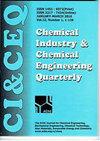Effects of exhaust gas recirculation on diesel engine using hybrid biodiesel
IF 0.8
4区 工程技术
Q4 CHEMISTRY, APPLIED
Chemical Industry & Chemical Engineering Quarterly
Pub Date : 2023-01-01
DOI:10.2298/ciceq230303022a
引用次数: 0
Abstract
The primary aim of this study is to alternate between conventional fossil fuels and reduce the emissions of greenhouse gases and sulphur dioxide from the diesel engine. In the current study, in order to mitigate NOx emissions, the EGR technique was implemented utilizing hybrid alternate biodiesel at three varying proportions of 5%, 10% and 15% at an optimum compression ratio of 20:1. The findings demonstrate that for a hybrid alternative biodiesel at a compression ratio of 20:1 and fully loaded, the BTHE is 31.8% with 10% EGR. With 15% EGR, the peak pressure for the hybrid biodiesel is lower than it would be without EGR by around 2.28%. When EGR is increased, the ignition delay and NOx emissions are reduced slightly. With only an increase in EGR rates of up to 10%, BSFC values were reduced efficiently. The hybrid biodiesel with 10% EGR achieves a reduction in exhaust gas temperature to 341 ?C.废气再循环对混合生物柴油柴油机的影响
这项研究的主要目的是在传统化石燃料之间进行替代,减少柴油发动机排放的温室气体和二氧化硫。在目前的研究中,为了减少NOx排放,EGR技术采用混合替代生物柴油,在5%、10%和15%的三种不同比例下,以20:1的最佳压缩比实施。研究结果表明,混合替代生物柴油在压缩比为20:1且满载时,BTHE为31.8%,EGR为10%。当EGR为15%时,混合生物柴油的峰值压力比没有EGR时低2.28%左右。当EGR增加时,点火延迟和NOx排放略有减少。只要EGR率增加10%,BSFC值就会有效降低。10% EGR的混合生物柴油可将废气温度降低至341℃。
本文章由计算机程序翻译,如有差异,请以英文原文为准。
求助全文
约1分钟内获得全文
求助全文
来源期刊

Chemical Industry & Chemical Engineering Quarterly
CHEMISTRY, APPLIED-ENGINEERING, CHEMICAL
CiteScore
2.10
自引率
0.00%
发文量
24
审稿时长
3.3 months
期刊介绍:
The Journal invites contributions to the following two main areas:
• Applied Chemistry dealing with the application of basic chemical sciences to industry
• Chemical Engineering dealing with the chemical and biochemical conversion of raw materials into different products as well as the design and operation of plants and equipment.
The Journal welcomes contributions focused on:
Chemical and Biochemical Engineering [...]
Process Systems Engineering[...]
Environmental Chemical and Process Engineering[...]
Materials Synthesis and Processing[...]
Food and Bioproducts Processing[...]
Process Technology[...]
 求助内容:
求助内容: 应助结果提醒方式:
应助结果提醒方式:


